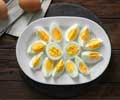In a medical first, a Canadian mother has frozen some of her eggs so her seven-year-old daughter can give birth should her genetic disorder make her infertile as an adult, a physician said Tuesday.
In a medical first, a Canadian mother has frozen some of her eggs so her seven-year-old daughter can give birth should her genetic disorder make her infertile as an adult, a physician said Tuesday.
If Flavie Boivin should become infertile, her mother's eggs could make it possible for her to give birth nonetheless, to a child who would be not only her offspring, but also her half-sister or half-brother."It's the first time in the world" for a mother-daughter egg donation, said Seang Lin Tan, professor and chairman of obstetrics and gynecology at McGill University, Montreal, and medical director of its reproductive center.
Tan, who treated Boivin, said McGill University Health Center's ethics committee gave its authorization for the extraction of her eggs, which will be kept frozen for years to come.
He said the daughter was under no obligation to accept the eggs.
"It's up to the daughter and her future partner to decide whether to use the eggs or not," he said. "She doesn't have to, and they may decide to donate the eggs to another couple and then have somebody else give eggs to them."
Tan said the egg-freezing procedure has been used for cancer patients at risk of menopause when they undergo chemotherapy.
Advertisement
"We know that this technique works," he told AFP. "We find that 85 percent of the eggs survive freezing and then there is 40 percent chance of a live birth."
Advertisement
Turner syndrome often leaves women incapable of producing eggs but with healthy wombs and can give birth through donated eggs.
"I was touched by her case because, in her own words, 'a mother should always do her best to help her children.' If her daughter had a kidney problem and she had to give a kidney, she would have done it too."
In an interview with the BBC, Melanie Boivin she said she wanted to do "everything in my power to help" her daughter, adding that she would never force her to accept her eggs if she did not want to.
"I just want her to have the option," she added.
"My partner and I wondered a long time about this donation. Will it be my kid or my daughter's?" she said in an April interview with La Presse daily.
"Finally, after a year of thinking about it, we decided that we could go through with it."
Tan said the egg-freezing procedure has "reached a stage where we can offer the same treatment to other women who may have children with problems of infertility."
"With egg freezing we can offer women who do not have yet have a partner a chance of having children. For example, a lady in her early 30s can decide to freeze her eggs and have a child later with a partner she loves," he added.
Tan presented a report on the Boivin case Monday at the annual meeting of the European Society of Human Reproduction and Embryology in Lyon, France.
Source-AFP
SRM/M










